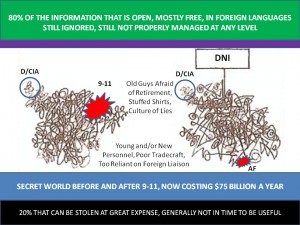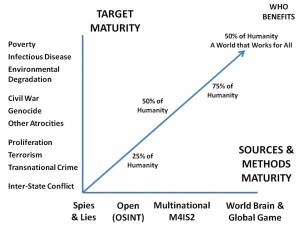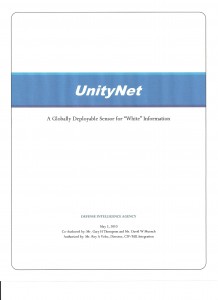CIA’s Iraq propaganda apparently run by 14 year old boys
Serious item, click on title to see cartoon and read both this piece, and the Washington Times Spy Talk piece that it refers to.
Serious item, click on title to see cartoon and read both this piece, and the Washington Times Spy Talk piece that it refers to.
See Also:

The Obama administration's war on whistleblowers — whose disclosures are one of the very few remaining avenues for learning what our government actually does — continues to intensify. Last month, the DOJ announced it had obtained an indictment against NSA whistleblower Thomas Drake, who exposed serious waste, abuse and possible illegality. Then, the DOJ re-issued a Bush era subpoena to Jim Risen of The New York Times, demanding the identity of his source who revealed an extremely inept and damaging CIA effort to infiltrate the Iranian nuclear program. And now, as Politico‘s Josh Gerstein reports, an FBI linguist who leaked what he believed to be evidence of lawbreaking is to receive a prison term that is “likely to become the longest ever served by a government employee accused of passing national security secrets to a member of the media.” As Gerstein explains:
[I]t reflects a surprising development: President Barack Obama’s Justice Department has taken a hard line against leakers, and Obama himself has expressed anger about disclosures of national security deliberations in the press. . . .
“They’re going after this at every opportunity and with unmatched vigor,” said Steven Aftergood of the Federation of American Scientists, a critic of government classification policy. . . .
Dr. Steve Metz was published on this topic by the Military Review in July-August 2001. A great deal of original thinking came out of the U.S. Army Strategic Studies Institute (SSI) in the aftermath of the 1998 Army Strategy Conference, and sadly, none of it has gained any traction with any Secretary of Defense (or State) since then. Should Senator Chuck Hagel (R-NE) actually be selected to be the new Director of National Intelligence (DNI), this is a concept he is going to have to integrate into his thinking.
Although Dr. Metz fully understands the asymmetry of will and touches on the asymmetry of morale, he does not address the core intelligence question of our century: the asymmetry of morality. Will & Ariel Durant understood this and highlighted the strategic value of being “in the right” in their capstone work, The Lessons of History. Others, including Buckminster Fuller in Critical Path and Dr. Robert Ackoff (see first link below), understood that context matters, and within context, morality and doing the right thing.
Morale is not the same as moral, and the “collateral advantage” that allows one to harness the distributed intelligence of the Whole Earth–to receive unsolicited warnings large and small, to receive unsolicited good ideas large and small–comes ONLY when one holds the moral high ground. It merits stressing that CONSENSUS is most easily achieved when those striving to achieve consensus share a common faith in integrity–in morality.
America is in the wrong today, because the US Government is imposing on both the domestic public and on humanity at large the wrong policies, the wrong programs, and the wrong acquisitions–as well as the wrong distribution of US taxpayer funds in the service of dictators, cartel leaders, and predatory immoral banks and businesses not at all interested in earning legal ethical profit fully compliant with true cost economics also known as the triple bottom line.
If the next DNI is to be successful, they must:
Continue reading “Reference: Strategic Asymmetry–with Comment”
 FULL STORY: Declassified (newsweek.com/blogs)
FULL STORY: Declassified (newsweek.com/blogs)
May 28, 2010
By Mark Hosenball
On Dennis Blair’s last day in office as director of national intelligence, the Obama administration seems more stymied than ever in its efforts to replace him.
Following a torrent of criticism from Capitol Hill—apparently touched off by this Declassified interview with Rep. Pete Hoekstra, the House Intelligence Committee’s top Republican—the candidacy of James Clapper looks doubtful to say the least. On top of Hoekstra’s criticism of the retired three-star general, who currently serves as the Defense Department’s intelligence chief, the Senate Intelligence Committee’s leaders are now also publicly saying they think he’s the wrong man for the job.
. . . . . .
The latest boomlet in speculation on potential candidates is centered on Michael Vickers, a former Green Beret and CIA operative who has been the Defense Department’s top civilian in charge of counterterrorism and special-operations programs slnce late in the Bush administration. Vickers was one of 15 potential DNI candidates we identified when news of the job opening broke….
. . . . . . .
But other names keep coming up. Some, such as Homeland Security undersecretary Rand Beers, Joint Chiefs of Staff Deputy Chairman Gen. James Cartwright, and outgoing Sen. Evan Bayh, have surfaced before (one former official who worked in national security positions with Beers describes him as “indefatigable”). But others are new to this particular search, including Rep. Jane Harman, former Ambassador to Iraq Ryan Crocker, and former CIA deputy director John McLaughlin.
 Phi Beta Iota: Worth a complete read. Here are the fifteen potential DNI's they identified earlier:, followed by our picks.
Phi Beta Iota: Worth a complete read. Here are the fifteen potential DNI's they identified earlier:, followed by our picks.
Political and bureaucratic heavyweights:
FBI Director Robert Mueller
CIA Director Leon Panetta
Deputy Secretary of State James Steinberg
Marine Gen. James Cartwright, deputy chair of the Joint Chiefs of Staff
Intelligence and defense technocrats:
Lt. Gen. Jim Clapper, currently Defense Department intelligence supremo;
Michael Vickers, assistant defense secretary for special operations;
John Hamre, a former deputy defense secretary;
Harvard academic Joseph Nye, also a former senior Pentagon official; and
John McHugh, a former GOP congressman whom Obama named as secretary of the Army.
High-profile intelligence politicos:
John Brennan, the White House counterterrorism and Homeland Security supremo; or
Rand Beers, a former career intelligence official who left his job as a senior counterterrorism adviser in the George W. Bush White House to become national security adviser to Democratic presidential candidate John Kerry, and now serves as undersecretary of Homeland Security
High-profile politicos:
former Sen. Chuck Hagel, a Republican close to Obama; former congressman and
intelligence-reform campaigner Lee Hamilton;
former Indiana senator Evan Bayh; and
former representative Tim Roemer (another intel-reform campaigner who is now U.S. ambassador in India)
 Phi Beta Iota: Everyone in the above lists is a ridiculous untenable suggestion with one exception: Senator Chuck Hagel. His combination of integrity, substantive experience, standing on the Hill, and general non-partisan common sense, is ideal. What he lacks is a kick-ass deputy who actually understands all the crap that the agencies–and their den mother Jim Clapper–put forward. Leon Panetta would actually be very good as the Deputy, responsible for turning off all funds to all agencies at 20% a year (10% a year restored for new initiatives; savings to education and national research under DNI oversight as provided for in the Smart Nation-Safe Nation Act) but Hagel is going to need a kitchen cabinet of truth-tellers and we are pretty sure he is not even aware of who they might be. That is his sucking chest wound–if he solves that he will not only earn Obama a second term, he will transcend politics and impact directly on the totality of all budgets–US, state & local, other nations, corporations, NGOs. Jack Devine is in the wings in New York, the Trilateral Commission's choice for either DNI or Director of Central Intelligence, he has our vote for the latter position.
Phi Beta Iota: Everyone in the above lists is a ridiculous untenable suggestion with one exception: Senator Chuck Hagel. His combination of integrity, substantive experience, standing on the Hill, and general non-partisan common sense, is ideal. What he lacks is a kick-ass deputy who actually understands all the crap that the agencies–and their den mother Jim Clapper–put forward. Leon Panetta would actually be very good as the Deputy, responsible for turning off all funds to all agencies at 20% a year (10% a year restored for new initiatives; savings to education and national research under DNI oversight as provided for in the Smart Nation-Safe Nation Act) but Hagel is going to need a kitchen cabinet of truth-tellers and we are pretty sure he is not even aware of who they might be. That is his sucking chest wound–if he solves that he will not only earn Obama a second term, he will transcend politics and impact directly on the totality of all budgets–US, state & local, other nations, corporations, NGOs. Jack Devine is in the wings in New York, the Trilateral Commission's choice for either DNI or Director of Central Intelligence, he has our vote for the latter position.
The problem President Obama has is in the White House is that no one working for him actually “gets it” with respect to 21st Century governance–between his pogomist and his pollster and his talented but oblivious others, he is running on fumes, will not get a second term, and is simply counting the days to when he can follow Bill Bradley, Al Gore, and Bill Clinton in Goldman Sachs honey-land–and screw the American public, they were never the intended beneficiaries of all this in the first place.
References for any future DNI:
Human Intelligence (HUMINT): All Humans, All Minds, All the Time (SSI, 2010)
The Smart Nation Act: Public Intelligence in the Public Interest (OSS, 2006)
Information Operations: All Information, All Languages, All the Time (OSS, 2006)
The New Craft of Intelligence: Personal, Public, & Political (OSS, 2002)
On Intelligence: Spies and Secrecy in an Open World (AFCEA, 2000; OSS, 2001)
and for the really big picture:
Intelligence for Earth: Clarity, Diversity, Integrity, & Sustainability (EIN, 2010)
Collective Intelligence: Crating a Prosperous World at Peace (EIN, 2008)
Peacekeeping Intelligence: Emerging Concepts for the Future (OSS, 2003)

See Also:
Operational Requirements Document
Technical Requirements Document
And Also:
Handbook: Synergy Strike Force, Dr. Dr. Dave Warner, Round II
and references therein down multiple levels…
As well as the thinking of Steve Edwards, Arno Reuser, and Mark Tovey; and among the Americans, Carol Dumaine, Jack Davis, and Ran Hock, among others.

SENATE SELECT COMMITTEE ON INTELLIGENCE Unclassified Executive Summary of the Committee Report on the Attempted Terrorist Attack on Northwest Airlines Flight 253
May 18, 2010
The SSCI report identifies fourteen specific points of failure-a series of human errors, technical problems, systemic obstacles, analytical misjudgments, and competing priorities-which resulted in Abdulmutallab being able to travel to the United States on December 25,2009. Those points of failure are:
1. The State Department Did Not Revoke Abdulmutallab's U.S. Visa.2. Abdulmutallab Was Not Placed in the “Terrorist Screening Database” (TSDB), on the Selectee List, or on the No Fly List.
3. Reporting Was Not Distributed to All Appropriate CIA Elements.
4. A CIA Regional Division, at CIA Headquarters, Did Not Search Databases Containing Reports Related to Abdulmutallab.
5. CIA Did Not Disseminate Key Reporting Until after the 12/25 Attempted Attack.
6. A CIA Counterterrorism Center (CTC) Office's Limited Name Search Failed to Uncover the Key Reports on Abdulmutallab.
7. CIA CTC Analysts Failed to Connect the Reporting on Abdulmutallab.
8. FBI Counterterrorism Analysts Could Not Access All Relevant Reports.
9. NCTC's Directorate of Intelligence Failed to Connect the Reporting on Abdulmutallab.
10. NCTC's Watchlisting Office Did Not Conduct Additional Research to Find Additional Derogatory Information to Place Abdulmutallab on a Watchlist.
11. NSA Did Not Pursue Potential Collection Opportunities That Could Have Provided Information on Abdulmutallab.
12. Analysts Did Not Connect Key Reports Partly Identifying Abdulmutallab and Failed to Ensure Dissemination of All Relevant Reporting.
13. NSA Did Not Nominate Abdulmutallab for Watchlisting or the Terrorist Identities Datamart Environment (TIDE) Based on Information Partly Identifying Him.
14. Intelligence Analysts Were Primarily Focused on Al-Qaeda in the Arabian Peninsula (AQAP) Threats to U.S. Interests in Yemen, Rather than on Potential AQAP Threats to the U.S. Homeland.
Related:
http://intelligence.senate.gov